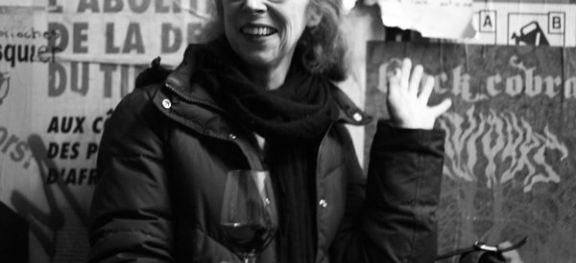Salicutti sold, Feiring hired

This is the first in a series of regular news updates on goings-on in Italian wine.
Alice Feiring engaged as chair of new Vinitaly award
Vinitaly, the mammoth annual wine exhibition in Verona, has completely overhauled its wine awards. Until recently, Veronafiere, which owns and runs Vinitaly, also organised the decidedly dinosaur-like Concorso Enologico Internazionale, or International Wine Competition. Its relevance dwindled over the years due to fewer and fewer wines submitted by producers and the antiquated methods of judging .
Not wanting to give up the competition, in 2015 it rebranded it the Vinitaly International Awards. With the overhaul it seems to have given up on the oft-ridiculed OIV scoring sheet and has instead opted for the 100-point system. This year, in a further move to modernisation, Veronafiere has managed to get New York-based wine writer on all things natural, Alice Feiring (pictured), on-board. She will chair a brand-new wine award called Free Wine: Wine without Walls. Feiring confirmed to me that she will chair the new award featuring organic wines. There will be two categories, one for no-added SO2 and one for up to 25 mg/l. Unwilling to use numerical scores, Feiring has formulated eight ‘wine qualities’ judges should look out for, while wines that get at least six out of eight will be awarded. The wine qualities Feiring mentioned to me so far are: emotional impact, liveliness and drinkability. Judging will start on 2 April and the competition is open to all wines that qualify.
L’Espresso fires the entire editorial staff of its Vini d’Italia guide
Another overhaul that is causing a small earthquake in the Italian blogosphere is the news that L’Espresso, one of Italy’s biggest national papers, has fired the entire staff, including all editors and tasters, of its wine guide Vini d’Italia. It is no secret that the once-omnipotent Italian wine guides have lost both their influence and reader interest. Speculation abounds about the move while Enzo Vizzari, responsible for the guide, has been quoted as saying that the overhaul will result in a ‘completely new editorial product’ which will no longer be a guide. The title of the new ‘product’ will be Vini dell’Espresso. The overhaul may be the result not only of falling sales but also of the list of wines that scored highest in the last edition of the guide. With very few newcomers, and appraisals firmly in favour of established names, the guide raised the eyebrows of wine producers and Italian wine journalist alike, leading to a further loss of the guide’s credibility as well as authority.
Counterfeit Moët & Chandon bottles confiscated
Some 9,000 bottles of counterfeit Moët & Chandon have been sequestered by the Guardia di Finanza, Italy’s financial police, in Padua on 1 February. In addition to the counterfeit bottles, which according to the online newspaper Il Fatto Quotidiano, would have had a street value of approximately €350,000, it also found tens of thousands of fake labels. The online wine platform Intravino reported that Il Fatto Quotidiano’s suggestion that Prosecco had been used, triggered a furious response from Stefano Zanette, the president of the Consorzio of the DOC Prosecco, saying he felt personally insulted by what he claimed was this false piece of information. Apparently the actual content of the bottles was sparkling white wine, without any further details of its provenance given by the Guardia di Finanza. However, the fact that the mastermind behind the counterfeit allegedly came from Valdobbiadene may have triggered the rumour.
Brunello estate Salicutti sold
The tiny and much admired Brunello estate Salicutti has been sold for allegedly €1.4 million to a group of German investors. The current owner Francesco Leanza confirmed he will stay on as its director for the foreseeable future. Currently, one hectare of Brunello vineyards has an estimated value of €400,000.
Become a member to view this article and thousands more!
- 15,409 featured articles
- 275,057 wine reviews
- Maps from The World Atlas of Wine, 8th edition (RRP £50)
- The Oxford Companion to Wine, 5th edition (RRP £50)
- Members’ forum
- 15,409 featured articles
- 275,057 wine reviews
- Maps from The World Atlas of Wine, 8th edition (RRP £50)
- The Oxford Companion to Wine, 5th edition (RRP £50)
- Members’ forum
- 48-hour preview of all scheduled articles
- Commercial use of our wine reviews
